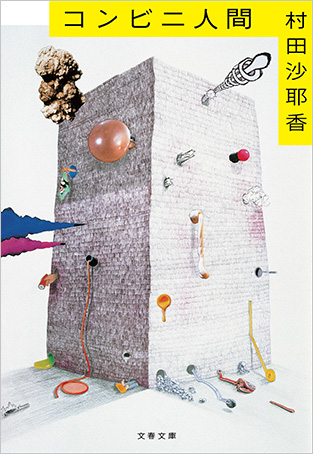
FICTION
Konbini ningen
[trans. Convenience Store Woman]
Bungeishunjū (Bunshun Bunko), 2018. 176 pp. ¥580. ISBN 978-4-16-791130-0.
Also published in: Chinese (traditional and simplified characters), Czech, Danish, Dutch, English, Finnish, French, German, Italian, Korean, Lithuanian, Norwegian, Polish, Portuguese, Romanian, Russian, Serbian, Spanish, Swedish, Turkish, and Thai
Japanese convenience stores, konbini, are open 24 hours a day, selling food, drink, alcohol, cigarettes, newspapers, books, and even underwear. They have ATMs and photocopiers and act as pickup points for parcels. Operating within extremely limited space, staff members strictly adhere to rules laid out precisely in manuals to serve customers. It is now difficult to imagine how Japanese people would live without konbini. Yet literary works have rarely explored the thoughts and feelings of the people who work there.
This book may have the honor of being the first work of literature on convenience stores. The protagonist is a woman who has worked part-time for nearly 20 years in one of these stores. The people around her regard spending such a length of time in this kind of stopgap job as not “normal” in itself. But having been unable to adapt to society since early childhood, she felt at home for the first time in a konbini and finds a sense of fulfillment in a job where she is constantly under pressure to function as part of an efficient mechanism. For her the “normal” world is not hers to live in.
“Gender, age, and nationality don’t matter. By wearing the same uniform, everyone is equal as a convenience store clerk.” With its paradoxical vision of the convenience store as utopia and its sharp criticism of the present state of society concealed behind a humorous narrative voice, this work presents a vision of the future of Japan. (NK)
This book may have the honor of being the first work of literature on convenience stores. The protagonist is a woman who has worked part-time for nearly 20 years in one of these stores. The people around her regard spending such a length of time in this kind of stopgap job as not “normal” in itself. But having been unable to adapt to society since early childhood, she felt at home for the first time in a konbini and finds a sense of fulfillment in a job where she is constantly under pressure to function as part of an efficient mechanism. For her the “normal” world is not hers to live in.
“Gender, age, and nationality don’t matter. By wearing the same uniform, everyone is equal as a convenience store clerk.” With its paradoxical vision of the convenience store as utopia and its sharp criticism of the present state of society concealed behind a humorous narrative voice, this work presents a vision of the future of Japan. (NK)

Translation rights inquiries
Bungeishunjū Ltd.
(attn. Rights Management Dept.)
3-23 Kioi-chō, Chiyoda-ku,
Tokyo 102-8008
Email: foreignrights@bunshun.co.jp
(When sending an e-mail, please enter a half-width character "@" instead of a full-width character "@.")

